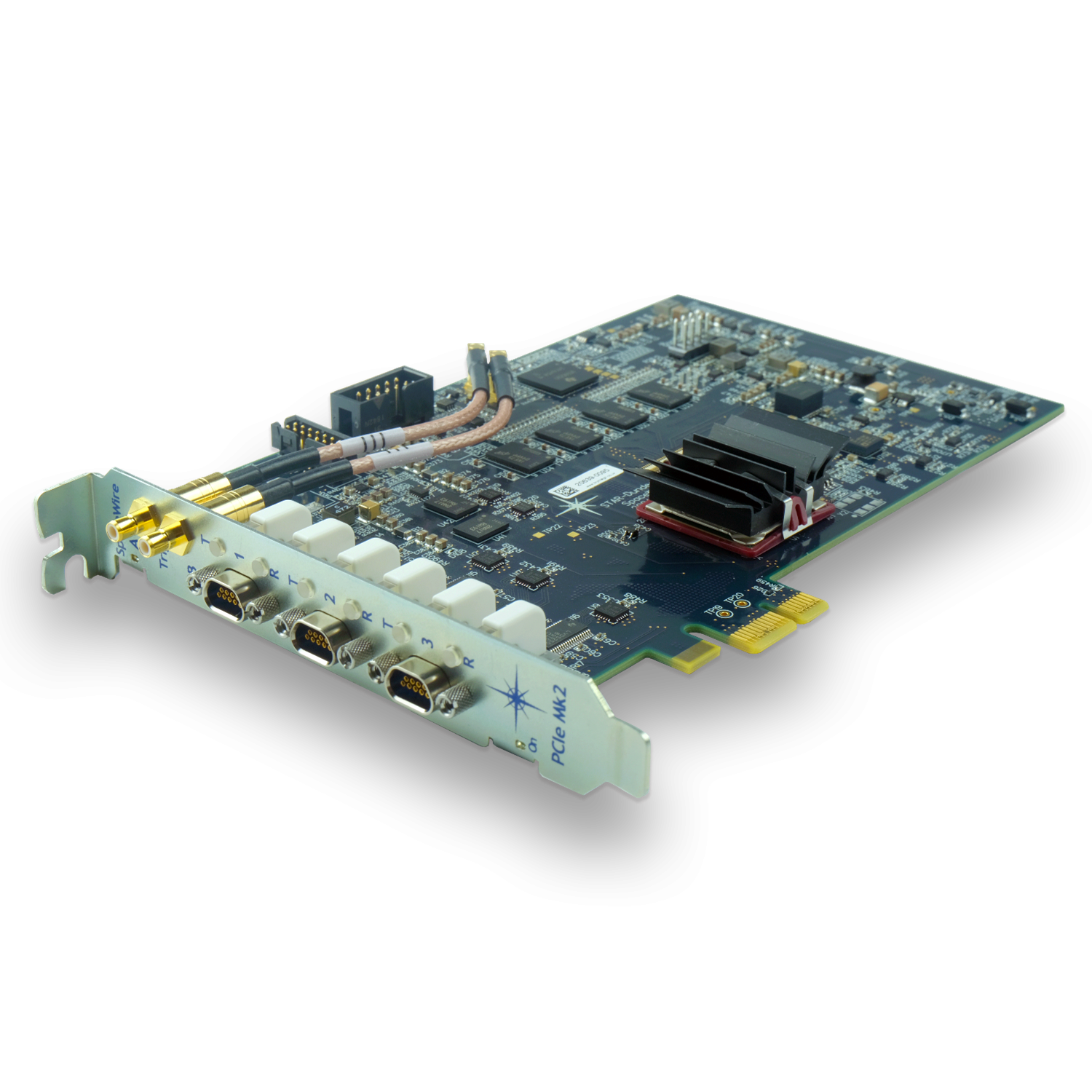SpaceWire PCIe Mk2
The SpaceWire PCIe Mk2 provides three SpaceWire interfaces with host software support for low latency transmission of SpaceWire packets directly to and from a host PC. The SpaceWire PCIe Mk2 board is a replacement for the widely used SpaceWire PCIe (Mk1) board. Backwards compatible with the SpaceWire PCIe Mk1 board, the Mk2 adds extensive fault protection to meet most FMEA requirements. The new board also includes two external triggers not present on the Mk1, to enable synchronisation of packet transmission with external events and signalling of packet reception, and other events, to external equipment. To facilitate fault protection the SpaceWire PCIe Mk2 is powered from both +3.3V and +12V, compared to the Mk1, which is powered by +3.3V only. The power for both +3.3V and +12V supplies is taken from the PCIe slot that the board is plugged into.
The SpaceWire PCIe Mk2 is suitable for all stages of SpaceWire equipment development: initial SpaceWire evaluation, instrument simulation, control system simulation, unit testing, and spacecraft equipment integration support.
The SpaceWire PCIe Mk2 hardware is supported by STAR-Dundee’s software stack, STAR-System, providing a consistent programming interface for accessing all STAR-Dundee’s most recent, and future, router and interface devices.
Product Features
Three SpaceWire Ports: Three SpaceWire ports each operating at up to 400 Mbit/s.
Backwards Compatible: The SpaceWire PCIe Mk2 is backwards compatible with the SpaceWire PCIe (Mk1) in terms of its functionality and the software interface.
High-Speed: The SpaceWire PCIe Mk2 is capable of transferring data at rates greater than 300 Mbit/s to and from host PC memory over all three ports simultaneously.
PCIe Compatible: The PCIe interface is a Gen-3, x1 lane. It is compatible with Gen-1, Gen-2, Gen-3 and Gen-4 PCIe slots of ×1, ×4, ×8 and ×16 widths.
Two External Trigger Interfaces: Two external SMB trigger interfaces are provided, which can be configured as input or output triggers.
Error Injection: Parity errors, escape errors and credit errors can all be injected on demand or in sequence with transmitted packets. Transmitted packets can also be terminated with an EEP.
Technical Specs
- Part Number
164
- Size
Standard PCIe x1 (half length) board approximately 167mm long (excluding front panel racket).
- Power
+3.3V DC and +12V DC, supplied via PCIe connector.
10 Watt slot compatible, supported by all PCIe slots.
- SpaceWire Ports
Compliant to ECSS-E50-12A, ECSS-E-ST-50-12C and ECSS-E-ST-50-12C Rev.1.
Number of SpaceWire ports: 3.
Connectors: 9-pin micro-miniature D-type.
Signalling: LVDS.
LVDS outputs can be tri-stated.
Maximum link speed: 400 Mbit/s.
Status indicators: one RGB LED for each direction of a SpaceWire port which indicates the link status.
- Trigger Ports
Two external 3.3V LVCMOS SMB trigger ports which can be configured as input or output triggers.
- Operating Temperature
25°C free air.
30°C airflow 25 LFM (0.13 m/s).
35°C airflow 50 LFM (0.25 m/s).
40°C airflow 80 LFM (0.41 m/s).
- Fault Protection
Protected against faults on the PCIe power supplies.
Protected against faults on the PCIe Mk2 board.
In the event of a fault, does not produce an adverse voltage on the SpaceWire ports.
When the PCIe board is powered down, the SpaceWire LVDS input current is between -20μA and +20μA.
Absolute maximum external voltage range that can be applied to the SpaceWire LVDS inputs and outputs is between -0.5V and 4.0V.
- EMC
The SpaceWire PCIe Mk2 board is sold as a component for inclusion in a computer unit. EMC certification is the responsibility of the user.
- Software
Provided with STAR-System software.
Application software included.
Source code examples provided.
- APIs
C, C++, Python.
LabVIEW API sold separately. (STAR-System for LabVIEW)
- Supported Platforms
Windows (Windows 11 and 10).
Linux (6.x, 5.x, 4.x and 3.x kernels, i386, x86-64 and ARM targets – other targets on request).
QNX, RTEMS and VxWorks support available separately.



